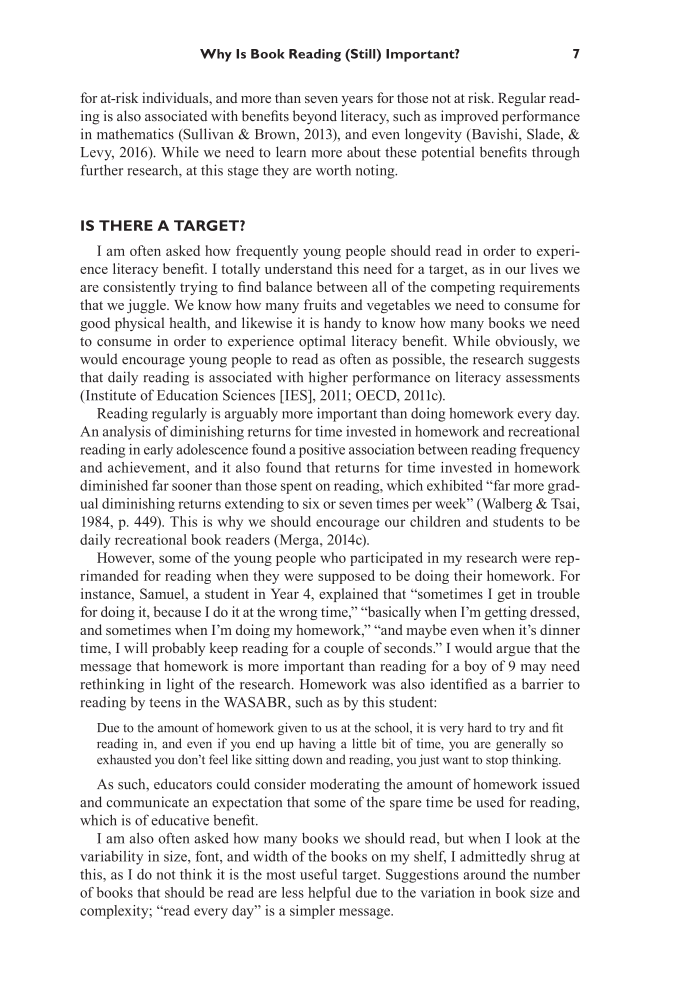Why Is Book Reading (Still) Important? 7 for at- risk individuals, and more than seven years for those not at risk. Regular read- ing is also associated with benefits beyond literacy, such as improved per for mance in mathe matics ( Sullivan & Brown, 2013), and even longevity (Bavishi, Slade, & Levy, 2016). While we need to learn more about these potential benefits through further research, at this stage they are worth noting. IS THERE A TARGET? I am often asked how frequently young people should read in order to experi- ence literacy benefit. I totally understand this need for a target, as in our lives we are consistently trying to find balance between all of the competing requirements that we juggle. We know how many fruits and vegetables we need to consume for good physical health, and likewise it is handy to know how many books we need to consume in order to experience optimal literacy benefit. While obviously, we would encourage young people to read as often as possible, the research suggests that daily reading is associated with higher performance on literacy assessments (Institute of Education Sciences [IES], 2011 OECD, 2011c). Reading regularly is arguably more important than doing homework every day. An analysis of diminishing returns for time invested in homework and recreational reading in early adolescence found a positive association between reading frequency and achievement, and it also found that returns for time invested in homework diminished far sooner than those spent on reading, which exhibited “far more grad- ual diminishing returns extending to six or seven times per week” (Walberg & Tsai, 1984, p. 449). This is why we should encourage our children and students to be daily recreational book readers (Merga, 2014c). However, some of the young people who participated in my research were rep- rimanded for reading when they were supposed to be doing their homework. For instance, Samuel, a student in Year 4, explained that “sometimes I get in trouble for doing it, because I do it at the wrong time,” “basically when I’m getting dressed, and sometimes when I’m doing my homework,” “and maybe even when it’s dinner time, I will probably keep reading for a couple of seconds.” I would argue that the message that homework is more important than reading for a boy of 9 may need rethinking in light of the research. Homework was also identified as a barrier to reading by teens in the WASABR, such as by this student: Due to the amount of homework given to us at the school, it is very hard to try and fit reading in, and even if you end up having a little bit of time, you are generally so exhausted you don’t feel like sitting down and reading, you just want to stop thinking. As such, educators could consider moderating the amount of homework issued and communicate an expectation that some of the spare time be used for reading, which is of educative benefit. I am also often asked how many books we should read, but when I look at the variability in size, font, and width of the books on my shelf, I admittedly shrug at this, as I do not think it is the most useful target. Suggestions around the number of books that should be read are less helpful due to the variation in book size and complexity “read every day” is a simpler message.
Document Details My Account Print multiple pages
Print
You have printed 0 times in the last 24 hours.
Your print count will reset on at .
You may print 0 more time(s) before then.
You may print a maximum of 0 pages at a time.

































































































































































































